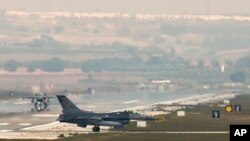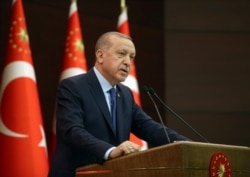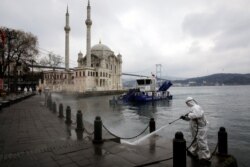Turkey has been flying F-16 fighter jets over the Libyan coast as it steps up its intervention in the country’s civil war. It also has sent a vessel to drill for oil off the coast of Cyprus, angering the island republic and its sister state, Greece. The two EU members states have placed their militaries on alert for fear of what they call further provocations from Turkey as the government of Recep Tayyip Erdogan faces trouble back home.
In a stinging statement, the Greek Foreign Ministry has accused Turkey of behaving in what it calls “delinquent” fashion … defying international rules and sending an exploratory vessel to drill for oil in waters for which Cyprus alone has rights.
The government in Nicosia, the capital of Cyprus, says the Turkish move is part of what it calls Ankara’s “illegal expansionist designs.”
It plans to raise the issue with its European Union partners at a meeting of foreign ministers today. Cyprus’ president also will take up the matter with his EU counterparts at a summit later this week.
He says the EU needs to step in and stop Turkey from conducting the controversial drill — its sixth attempt this year alone.
European leaders repeatedly have advised Ankara to show restraint.
But Turkish President Recep Tayyip Erdogan insists his government is not breaking any rules. Instead, he insists his country also has legitimate and sovereign rights in the oil and mineral rich eastern Mediterranean and in the Aegean Sea.
"Turkey will continue to defend these rights," he said, after a Cabinet meeting. "It’s this decisiveness that makes Turkey strong."
While both NATO allies, Greece and Turkey have been at loggerheads for ages over conflicting claims to air and sea rights in the Aegean, the vast waterway that divides the two nations.
Relations between Athens and Ankara have been strained since Turkey invaded Cyprus, a military offensive that has left the Mediterranean island divided into Greek and Turkish sections for nearly half a century now.
Massive gas reserves discovered off the coast of Cyprus in recent years have come to complicate relations.
Regional countries, including Egypt, Greece and Israel, have formed key energy alliances, leaving Turkey alone, insisting it, too, is entitled to a share of the multi-billion-dollar profits because it controls the Turkish occupied section of northern Cyprus.
With the Turkish economy now crumbling, and the country struggling to contain the spread of the coronavirus, experts like Angelos Syrigos warn that Ankara will continue to behave provocatively.
"It wants to deflect attention from its domestic troubles," he says. "Turkey wants to keep showing it remains a regional superpower."
That’s the reason, he explains, that Turkey has been provoking the West in recent days, sending rafts of illegal refugees to Greece. Fighter jets also have been ordered to soar through Greek airspace, engaging in risky chases and aerial stunts with Greek fighter jets
The tactics may be helping Turkey keep up its regional superpower appearances, but experts warn this could result in an accident where tensions spill over into a full-blown conflict.







